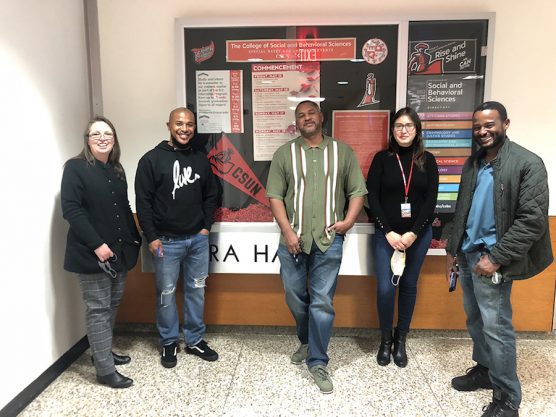Finding affordable housing in a city like Los Angeles is a challenge. Add on the stigma associated with being formerly incarcerated, and the prospect of finding a safe place to study and lay your head at night seems nearly impossible for some college students.
California State University, Northridge — along with Fresno State, Cal Poly Pomona, Cal State Los Angeles, Sacramento State, and San Francisco State University — received a $25,000 grant from the nonprofit Michelson 20MM to develop a data-informed toolkit to help formerly incarcerated students on campuses throughout the California State University system find housing.
“Safe, sustainable housing is a fundamental right for everyone,” said Chicana/o studies professor Martha Escobar, executive director of CSUN’s Project Rebound, an initiative designed to help guide formerly incarcerated students on their academic journey and connect them with campus liaisons committed to their success. “When you are formerly incarcerated, finding that housing can be so much harder. What we hope to do is develop a toolkit, a template if you will, that can be used — with minor tweaks to reflect the uniqueness of each campus and the communities they are in — by Project Rebounds across the CSU to help their formerly incarcerated students find and retain housing.”
“It’s hard enough to be a student during these times,” Escobar continued. “Add on the burden of not being sure of where you are going to sleep each night, and the pressure can interrupt a student on their way to earning a college degree.”
Founded by Dr. Gary K. Michelson, an orthopedic and spinal surgeon, inventor and philanthropist, Michelson 20MM is dedicated to supporting and investing in entrepreneurs, technologies, and higher learning initiatives that seek to transform lives. Among its efforts is supporting organizations that get students into college, help them stay enrolled until they graduate and help them re-enroll if they’ve dropped out.
Escobar and Lily Gonzalez, Project Rebound’s coordinator, said the grant will support efforts to leverage basic needs assessment data collected by the Project Rebound Consortium, a coalition of CSU campuses that offer the program, and housing insecurity data about CSU students as a whole to develop the toolkit. Once completed, the kit will include a flexible template that campuses across the system can use to identify housing needs and ways to find and secure grants, as well as suggestions for establishing off-campus partnerships and tapping into other available resources.
If the toolkit proves to be effective, Escobar said she and Gonzalez hope to use it as a model for addressing other pressing student needs.
“We have students who are commuting to the Valley from as far away as South Los Angeles, and living in environments that are not conducive to studying,” she said. “We have students who are single parents. There are so many issues that this toolkit could provide a template for.”
Gonzalez agreed.
“The journey to a college education is much more layered than most people realize,” she said. “The key to success is building relationships within and outside the university so that students have the support they need when they need it. The tool kit could play an important role in helping campuses establish and maintain those relationships that help our students succeed.”
Project Rebound originated more than 50 years ago at San Francisco State University as a way to matriculate people into the university directly from the criminal justice system. In 2016, with the support of the Opportunity Institute and the CSU Chancellor’s Office, Project Rebound expanded beyond San Francisco State into a consortium that grew to 14 campus programs, including CSUN’s.
Like this:
Like Loading...
Related





 Tweet This
Tweet This Facebook
Facebook Digg This
Digg This Bookmark
Bookmark Stumble
Stumble RSS
RSS































REAL NAMES ONLY: All posters must use their real individual or business name. This applies equally to Twitter account holders who use a nickname.
0 Comments
You can be the first one to leave a comment.